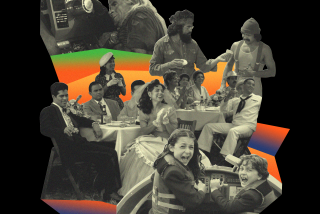Sitcom on Latino kids speaks PBS’ language
- Share via
At a time when commercial broadcasters seem to be decreasing their commitment to children’s programming, the Corp. for Public Broadcasting has given its largest single grant for a children’s show to fund “The Misadventures of Maya and Miguel,” a new PBS animated situation comedy chronicling the lives of 10-year-old Latino twins. It’s set to premiere in the fall of 2004.
Scholastic Entertainment Inc., the production company responsible for PBS’ popular “Clifford the Big Red Dog” and “The Magic School Bus” series, created the daily strip, comprising 65 half-hour programs. “Maya and Miguel” is PBS’ first situation comedy geared to 6- to 8-year-olds, although it will also aim to engage adults. The series is the main focus, but Scholastic will also offer a Web site and educational and community outreach materials related to “The Misadventures of Maya and Miguel.” They’re intended to help build on the language skills, understanding and tolerance explored in the series that focuses on how the twins try to leave their mark on the culturally diverse world around them.
CPB, a private, nonprofit corporation that funds public television and radio programming, gave $9.2 million to Scholastic Entertainment with PBS and the Department of Education providing another $5 million.
“We have been very excited about this,” said John Wilson, co-chief program executive for PBS. “The children’s lineup on PBS has proven to be a place that Latino households in particular come to watch, so we think that adding something like ‘Maya and Miguel’ builds on that appetite.”
Wilson said he hopes the series will have the same broad appeal as Robert Rodriguez’s hit “Spy Kids” children’s films, which are centered on a Latino family. “But they are a lot of fun for all audiences,” Wilson said. “I think that is what ‘Maya and Miguel’ can do for us. It’s a show that anybody can watch, but Latinos can watch and see themselves represented in a positive, fun way and that’s a good thing.”
The series will be broadcast in English and Spanish. Wilson said that means “a Spanish-speaking audience or an audience where English is a second language can feel there is some resonance with them.”
The series is organized around two educational goals, said Deborah A. Forte, president of Scholastic Entertainment. “It’s to promote the value of a culturally diverse society and to support English language acquisition and usage. And that again is not just for Hispanic children. If today’s children are going to live and learn and be happy citizens of the country and the world, it’s necessary for them to value each other for their differences as well as their similarities. This is very different from the ‘melting pot’ theory. This is more a ‘mosaic’ theory. This is about having different cultures who remain distinct and have them appreciated for their differences and uniqueness.”
Forte said her company originally developed the show with commercial broadcasting in mind. But when it learned that CPB was seeking to fund a new children’s program, it changed plans and submitted “Maya and Miguel.”
“It’s very difficult and expensive to launch a new daily animated show,” said Michael Pace, CPB’s senior vice president of television programming.
He said the reason the grant was so large is “that we wanted to make sure there was a commitment to keep it on the air to affect an audience, which is hard to do. It takes awhile and animation is expensive. We wanted to roll it out in other ways, like educational outreach, which also raises the cost. We wanted to make sure all of that was in place.”
Oakland-based child advocacy group Children Now released a report almost two weeks ago that it said shows a decrease in the number of children’s shows, and the amount of time devoted to airing them, as a result of media consolidation.
Scholastic has assembled a national advisory board for the series that comprises educational and media researchers, experts in the needs of children with low English proficiency, as well as experts in diversity, multiculturalism, family literacy and leaders within the Latino community.
Advisory board member Felix R. Sanchez, co-founder and president of the National Hispanic Foundation of the Arts, has been involved with Scholastic on “Maya and Miguel” since the inception of the idea. “As they began to develop this concept they came to us and asked us to be engaged in the thinking and developing process,” he said.
“We are ecstatic with this idea of bringing forward a television program for children because there is such an under-representation of Latinos that it is important to grow these projects. We Latinos are not a monolith of any sort. We have extraordinary diversity in our own umbrella community and this show will have an opportunity to explore the many facets of Latino-ness in our country.”
More to Read
The biggest entertainment stories
Get our big stories about Hollywood, film, television, music, arts, culture and more right in your inbox as soon as they publish.
You may occasionally receive promotional content from the Los Angeles Times.











